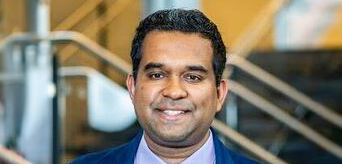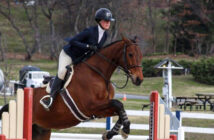On a dark and chilly Tuesday night last October, professor Dhruv Seshadri looked over at his visibly exhausted first-year and first-ever doctoral student, Joe Amitrano, hard at work in his office.
Amitrano and Seshadri were preparing their lab’s studies for review from Lehigh’s Internal Review Board— a tiring process that every lab study must go through to be approved.
Seshadri paused for a moment and suggested something Amitrano would have never expected.
“‘You know what, let’s take a break and watch some basketball,’” Amitrano recalls Seshadri saying.
So, Seshadri ordered a pizza, and they watched a basketball game.
For Seshadri, creating a work environment that feels like family is essential to doing meaningful work. He hopes to make people happy and excited to come into work.
“We bonded over aspirations, life goals and how we got to where we were,” Amitrano said. “Then after that, we cranked out the (Internal Review Boards) and got them submitted.”
Seshadri began his journey in South Bethlehem this past fall, joining the Department of Bioengineering as an assistant professor in August 2023. He received his doctorate in biomedical engineering from Case Western Reserve University in Cleveland in 2021.
While completing his master’s degree at Case Western, Seshadri had the opportunity to work with the NFL’s Cleveland Browns on wearable technology that helps to reduce injury in athletes. Ever since then, the desire to develop and create wearable technology has stuck with Seshadri.
Seshadri said in the years since, he and his team of researchers have published over 20 papers on wearable technology. He’s also part of an ongoing study funded through the American Orthopedic Society for Sports Medicine, which uses wearable technologies that allow athletes to return to play following anterior cruciate ligament reconstruction.
Additionally, maternal and neonatal health are major areas of concern in Seshadri’s research and work. He said they are areas of medicine that are extremely underserved in lower- and middle-income countries today.
“The more I read into it, the more I saw that there was an unmet medical need, and that was what galvanized me to realize that there is a career in wearable technology, sports medicine, but also in other areas of medicine that really necessitate remote monitoring and predictive analytics,” Seshadri said.
This January, Seshadri was awarded the Lehigh Faculty Internationalization Grant, which is awarded to faculty members aspiring to work on international research collaborations. Seshadri will travel to Palakkad, India, with students and interns to collaborate with his colleagues at The Indian Institute of Technology on clinical research and trials in wearable technology.
Seshadri said he hopes his work in India will have a lasting impact in the health field worldwide. He also hopes to eventually commercialize and develop his projects into products that can be available to populations across the world.
He said his work will focus on topics in wearable technologies, including recapitulating internal care unit-grade vitals that are monitored with wired systems. They will be able to do so in a wireless manner, without compromising clinical decision making.
Seshadri said he is excited for the opportunity to collaborate with his peers in India, to research what he hopes will help in any area of medicine where digital health technologies like wearable technology are not currently used.
“We can take those learnings, bring them back to Lehigh, have students then engineer those devices and send them back,” Seshadri said.
Anand Ramamurthi, the chair of the Department of Bioengineering, said the work Seshadri is doing is “clinically significant,” and the department is proud of the impact he’s made in the short amount of time he’s been at Lehigh.
Seshadri is currently an assistant professor but will likely transition into a teaching role next year, which is the department’s normal procedure for new faculty members who intend to be professors.
“We can already see from the way he mentors his students in his lab as research students, whether it’s an undergraduate or graduate student, the way he mentors them, how he develops their skills in the lab, I think that is quite illustrative of the way he would be in the classroom,” Ramamurthi said.
Seshadri said he’s been grateful to the rest of the faculty and staff for their hospitality and helpfulness since his arrival.
“We have a faculty happy hour that meets every Friday, and it’s not just professors,” Seshadri said. “We have the vice provost for research for the university that meets with us, sitting down next to me as an assistant professor. So, there’s no ego when it comes to being able to work with people. They’re quite fun, actually.”
Amitrano also said after he once expressed to Seshadri that he wanted to go into a non-traditional consulting role after earning his doctorate, Seshadri has since continually pushed him to try projects that are tailored to his interests.
“He’s everything I’ve wanted in a mentor,” Amitrano said. “He’s always active. He’s always working. He’s always there for me. He’s always looking out.”






Comment policy
Comments posted to The Brown and White website are reviewed by a moderator before being approved. Incendiary speech or harassing language, including comments targeted at individuals, may be deemed unacceptable and not published. Spam and other soliciting will also be declined.
The Brown and White also reserves the right to not publish entirely anonymous comments.
1 Comment
Can I simply just say what a relief to discover an individual who really knows what they’re talking about over the internet. You certainly know how to bring a problem to light and make it important. A lot more people really need to check this out and understand this side of your story. It’s surprising you aren’t more popular since you certainly possess the gift.